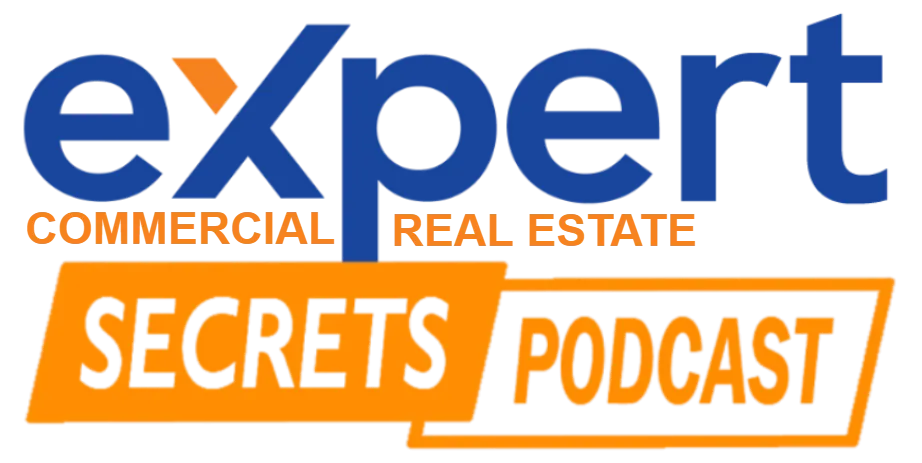
The Advantages Of CRE Syndication On Your Passive Investments with Brad Shepherd

I'm working with teams who are already experienced, I don't want to bring deals to my investors, where I want them to be the guinea pigs, I don't want to be the guinea pig. And so I'm looking at their track record, what is their portfolio? What do their exits look like? What does their management team look like both the operator team is was the property management that they're using my very first experience in as a passive investor, I participated in a single asset property about an hour and a half south of Houston, right near the Gulf, got slammed with Hurricane, whatever hurricane that was, I think it was Harvey, deep value, add new construction on the property. It's been rough. It was a rough deal. And so it turned me off to the idea that the deep value c minus type properties, I really liked the B, B class properties and operators that focus there where it's still a value add component, we're not talking about new construction, we're not talking about a class, there's still a value add component, but it's not the value added. These are properties that are already doing well, they could just do better. And so I'm looking for operators focused on that kind of framework, so that I can take that back to my investors confidently telling them, Hey, this is the kind of stuff I know works that I participated in. And then well, it's Yeah, you might get some bigger returns on a deep value play. But there are certainly some bigger risks. And I've seen that firsthand. And so I like the ones where I can come back to my investors and say, the safe bets, these are going to go well. And we've got a team that can execute that plan.
Watch the episode here:
Listen to the podcast here:
The Advantages Of CRE Syndication On Your Passive Investments with Brad Shepherd
Brett:
I'm calling or zooming in from the great state of Texas in the Austin area. I'm excited about our next guest. He is a part of Sugarhouse Investments, and they really focus on helping busy busy professionals create income through hassle free real estate investments. And he's going to share with us so much more, please welcome to show with me, Brad Shepherd Brad, how are you doing?
Brad:
Doing fantastic. Brett, thank you very much for having me. Excited to join you today.
Brett:
Absolutely. Would you get us started with your listeners a little bit more about your background and your current focus?
Brad:
Sure, Yeah, I've been participating in real estate in one way or another for a good 20 years now and bought my first rental of my own for my own private portfolio back in 2001. Right after I graduated college, a little condo. And ever since then you've had the bug could see the value of real estate I've done various things like building up a rental portfolio fix and flips, wholesaling some land flipping land, got even got into some commercial development, about 10 years ago, we had a fairly decent size of vacation rentals, a portfolio of vacation rentals before there was such a thing as an Airbnb. So I've been doing it for a while. And about three years ago, where I'm sitting in a very competitive market, especially in the single-family realm here in Austin, started looking at getting back into commercials. And so we started exploring, you know, the idea of participating in or seeking out opportunities to invest in mobile home parks, Self Storage Units, and apartment complexes and really just fell back in love with the commercial side of real estate and began investing passively, first, loved how that was going. And I decided, well, I want to be involved in this full time. And I found a great little niche where I've been able to educate others on the opportunities as passive investors in these commercial multifamily opportunities and or commercial real estate in general. And so for the last two or three years, that's really exclusively exclusively, what I focused on is educating generally accredited investors on these opportunities, and connecting them with successful operators. And so far, that's been really enjoyable. And it's been a fun little niche for me.
Brett:
Got it. That's awesome. That's fantastic. I'm looking forward to diving into of some of those strategies and some of those educational topics here in a second. But I will take one step back for it. Now, I believe we've all been given certain gifts in this life, and I want you to go back maybe to the high school or college days, your younger self, and I want you to picture the time when you're there. And maybe it's a mentor or a coach or a parent and they're and they're and they're telling you, Hey, I think you have this gift or this talent, you know, or this strength. You know, I believe we've been given certain gifts in this life and these gifts are given to us to be a blessing for others. So I'm curious, what is that one or two gifts that you believe you were given? And how does that help how you help and bless people today?
Brad:
Well, that's a good question going deep there. It's a double-edged sword. I remember having butting heads with my mom quite a bit growing up. She always talked about what you can call persistence or stubbornness. So it is a bit of a double-edged sword there. But she talked about how she shared a story when I was a baby you know with some of our other kids. If there was something that she didn't want them to play with she could just take him to the other room distract him with something and with me Didn't matter where she took me I did find my way I really want to go back to what I was working on before or even if you didn't want me to be working on it. So for me I lock into ideas I get maybe obsessed with them. persistent is a good way to get away to put it. And so that served me well. I feel like once I've got something in mind that I want to achieve. I'm just gonna figure out how to do it. I'm not the smartest guy in the room. In high school, I felt smart. I got to college and realized I wasn't a very smart person, a lot smarter than me. But I'm very good at being just getting stuff done and being very persistent and until I get there,
Brett:
Got it, I love that persistence. stubbornness. And sometimes it's a fine line. You can learn more about Brad Shepard at sugarhouseinvestments.com. That's sugarhouse. Investments are calm. So Brad, let's jump into some real estate talk. Okay, so we're Austin, Texas seems to be blooming and booming for a while, seems to be only increasing with, with folks like where I live that are in like California or the states like New York that are very, pretty heavy tax states, maybe not as friendly for businesses. So I think Oracle, HP, and I believe Tesla and last. Yeah, all decided to relocate their headquarters to a place called Austin, Texas. So let's talk about Austin, Texas real estate market. Is that a place that you're investing in? And what is your take on some of the migration that's happening throughout the United States?
Brad:
Well, I'll tell you, I would much rather live in a place where people want to come to, right? than I've been to places where it's a net minus migration. And those aren't fun towns to be in, those are fun towns to want to invest in. So I'm all for what's going on in Austin, and the new energy that's come here, my wife and I, we have been here for 10 years. And yeah, we've, within a handful of years, we started we were among that group saying, Man, they're tearing that down, or man, where did all these people come from, or what have to pay for parking here now. So I mean, we experienced that stuff. And there's, you know, it's, it's always a shame to it. But again, I'd rather be in a place that's growing and thriving, and Austin just has so much going for it. It's the least Texas, of all the towns of all the cities in Texas, good or bad, you know, take that for good or for bad. But it just has such a unique mix of business, tech, and art and music, and lifestyle. It's just a fun mix, we really enjoy it does make investing in real estate difficult. It's not a cash flow town at all. So what we are competing against right now, especially on the single-family side is if you want to buy a rental if you want to buy your own home to live in, we are going up against the significant number of out of state investors, a lot of Californians who are coming in here with high cash offers significantly over asking price, and there's just no chance of buying cash flowing. Single Family three, four or five units. property here.

Brett:
Yeah, I know, thanks for sharing. Thanks for sharing that it's on fire. So now let's talk about places you are investing in, which I think is mostly the southeast. And it's a walkthrough, how are you guys structured? Are you a fund? Are you finding and operating the deals? Are you finding operators to invest with, like a walk through exactly what you guys do at Sugarhouse Investments?
Brad:
Yeah, so sugarhouse investments, specifically, we are coast indicators. You know, when I wanted to get into commercial real estate, I started talking to commercial brokers looking at sourcing my own deals, realized how much of a team sport it is, and the systems and structure that are required to do well here. And so in doing so, I learned about other operators who were already doing well but had specific needs that I knew I could help with. And so was able to find alignment opportunities with operators who are already doing well. And my primary role, this point is Investor Relations, I always help with due diligence, I'm always flying out to the properties, doing the market checks, walking through the units, so that I can be part of that vetting process. But then from there, the main operator team is going to focus on executing the business plan, managing the manager, I'm going to focus on the investors. And so as investor relations slash capital raise function, which is fantastic, I love that element. So to be clear, we do have a couple of properties, meaning apartment complexes here in Austin, we have many up in Dallas and some good handful in San Antonio, those are great markets. in Austin, the cap rates are tighter. So we have to be you know, it's not we just don't find a whole lot of great deals here. The two that we do have to happen to be good relationships with the broker and giving him an off-market scenario. But it's so outside of Texas, we really like those southeast southeastern states, like so many others do. Georgia, the Carolinas, Florida are where we focus on right now. And those markets have done really well for us.
Brett:
Excellent. Yeah, we're talking about financial freedom through passive commercial real estate investments. And so you have a quote with Brad Shepherd here and so you have a co syndication model where you're, you're with the investor's face, you know, and building that relationship helping educate also, some you're vetting the deals as well. You're hands-on, you're flying to the properties you're walking through, you're going through the numbers, so you but the heavy lifting as far as the operations, that's for someone else is strength and your strength is on investors relationships is great. Is that a fair summary?
Brad:
That is that is. And I just looked at that and thought rather than me having to build up all those systems and those relationships, I knew I could see opportunities for me to come in and partner with folks who have already built those heavy lifting elements. And I could provide a valuable component to that.
Brett:
Beautiful love it. And so what's the biggest secret to making sure that you're working with quality operators, and you're being a co syndicator? with them? What have you found that's worked? And maybe things that, you know, have not worked out? What are you looking for when you're looking to be a co syndicator? Or somebody?
Brad:
Yeah certainly, I'm working with teams who are already experienced, I don't want to bring deals to my investors, where I want them to be the guinea pigs, I don't want to be the guinea pig. And so I'm looking at their track record, what is their portfolio? What do their exits look like? What does their management team look like both the operator team is was the property management that they're using my very first experience in as a passive investor, I participated in a single asset property about an hour and a half south of Houston, right near the Gulf, got slammed with Hurricane, whatever hurricane that was, I think it was Harvey, deep value, add new construction on the property. It's been rough. It was a rough deal. And so it turned me off to the idea that the deep value c minus type properties, I really liked the B, B class properties and operators that focus there where it's still a value add component, we're not talking about new construction, we're not talking about a class, there's still a value add component, but it's not the value added. These are properties that are already doing well, they could just do better. And so I'm looking for operators focused on that kind of framework, so that I can take that back to my investors confidently telling them, Hey, this is the kind of stuff I know works that I participated in. And then well, it's Yeah, you might get some bigger returns on a deep value play. But there are certainly some bigger risks. And I've seen that firsthand. And so I like the ones where I can come back to my investors and say, the safe bets, these are going to go well. And we've got a team that can execute that plan.
Brett:
Perfect. That makes sense. Yeah, make sure you're vetting the experience level and the track record and figuring out if they've had a proven exit plan, right, proven track record, and then making sure you're communicating what, what is most valuable for the future deals? Very good. Um, Where are you seeing as far as opportunities if you had to pick one state? What's your favorite place to find deals right now?
Brad:
Oh, boy, it'd be hard to pick one. The next deal that we're doing we're working on right now we're actually raising money for to this point is in Atlanta, the Atlanta is like in Austin, but bigger, you have so much net positive immigration or migration going there. People love it. There are a lot of things going for it: a good economy, good tax structure, good, good regulation levels. So, you know, we were picking it, we're gonna pick up another property right behind this Atlanta, one in Jacksonville. And so I do like Florida. But I think, you know, just if you're making me choose one, I think I would go to Atlanta and you get a little further off the coast a little more steady cut type of a population. As opposed to, for example, we have one property in Orlando within COVID hit a lot of the tenants, there were employees at the theme parks and university students, and they all got sent home. And so we took a hit on occupancy there where you're not gonna experience that same type of thing in most likely
Brett:
Atlanta, Georgia is the spot. Excellent. So we do focus here, capital gains tax solutions, and also Expert CRE secrets for ways to defer capital gains taxes, not using a 1031 exchange, we got a thing called a deferred sales trust. It's pretty cool. And we help people understand that. But I'm curious, what's the biggest frustration that you've found with? It could be real estate investors, business owners that you've worked with high net worth individuals when it comes to capital gains tax deferral options?
Brad:
It's complicated. You know, when we get into these commercial syndications, we're doing cost segregation studies. So we can accelerate depreciation so we get a really good net negative number on our K ones. But then once there is an exit, there's your recapturing depreciation, and now you've got a game to deal with. And the 1031 scenarios in syndications are tough. It's not impossible, but they're, they're tough. And so you know, what your, your expertise is in I'm sure would be very appealing to the type of people that I'm working with, because it is you know, you've got these three or four or five years with great negative cash flow on these k ones, even though you've got money coming in. But then there is this depreciation recapture. And what do you do from there? We do have a lot of investors that will go into these opportunities with solo 401 K's or self-directed IRAs, you have the concern of UBTI tax the UBTI tax. And the paperwork is just complicated with custodians, not again, it's not a huge hassle, but it is a hassle when you're doing with those plans on how to get the custodian involved. And so between recapture difficulty of the 1030 ones in these scenarios and hassles with custodians, and doing it through tax-deferred accounts can be a bit of a challenge.

Brett:
Yeah, absolutely. And by the way, we have a solution for all of that. It's called the deferred sales trust. You can learn more about that a capitalgainstaxsolutions.com, we actually set a deal in Vegas as a $20 million sale for multifamily syndicator. And their GP positions, they were able to use that just for there for their portions. And then they did another one in Arizona for $16 million, multifamily sale, same thing. And then the cool thing is, once the funds are in the trust, they're able to use a portion of them to go back into another syndication that they're buying. So it's a nice way to stay tax-deferred and get flexibility without having to do the 1031 exchange and without having to every LP set up their own. It's pretty seamless. So we like to call it the Netflix to the old way of blockbuster way of doing things like 1031 are just like the Netflix is pretty seamless. So again, you can learn more about that at capitalgainstaxsolutions.com enough with that, though, are you ready for the lightning round? Brad?
Brad:
Let's do it.
Brett:
All right, knowing what you know. Now, if you go back to your 25-year-old self, what's the one Golden Nugget you would make sure you would do?
Brad:
Partner earlier. Before the last three years when I began working on sugarhouse investments. I saw him and I saw myself as a lone wolf. I've been able to accelerate my growth as soon as I began aligning myself with other successful operators. So I tell that 25-year-old self partner up the sooner the better.
Brett:
Excellent. Second question, what's the number one book you've recommended or gift at the most in the past year?
Brad:
In the past year, I'd say it's Hal Elrod Miracle Morning. I know that's a popular one. But I've enjoyed that one. It's all about getting up early in the morning and having a routine good start your day before the kids wake. And yes, starting the day off on the right foot.
Brett:
Yeah, I agree. I just implemented that book a couple of years ago. And it's one of the most applicable books, right? And if you follow it, I mean, I have yet to meet someone. So yeah, I followed it. And I regret it right. I've actually fallen in. I feel great. And yeah, so great. Excellent. Next question. What are you curious about right now?
Brad:
That's, that's a good question. As soon as you asked that question. What popped in my mind is my four-year-old. He's curious about everything. And so I get curious about his curiosity and how he sees the world. So that's, that's the first thing that pops in. I generally am. I like to learn a little bit about a lot of different things. So reading the book, like on the guy's name, but it's the book called The history of everything, a short history of everything. It's been really fun to read that. So just, you know, just general World Science, dinosaurs, that kind of stuff is I just, I just kind of fun. It's fun, like, light-hearted stuff to read about.
Brett:
It's a good thing to say light-hearted these days. Because if you don't, then it's a, it's easy to get pretty heavy with a lot of stuff that's going on. Well, well, Bradley, we've run out of time now. So I want to ask one last question. And then I want you to remind the listeners where they can find you. So after all your success helping people passively into investment, real estate deals, and, and building your company. I'm curious, how do you stay centered in your values? And how do you stay encouraged to reach forward for new goals?
Brad:
That's a great question. I am a religious individual. I have a religious practice that helps me significantly part of my Hal Elrod Miracle Morning is a scripture study practice is prayer. I'm not saying everybody has to do that. But having some time to just reflect whether that's meditation or mindfulness practices, I certainly recommend those. Those are, those practices have been really helpful for me. And my religious practice provides me a lot of service opportunities as well, where I get to help people on a regular basis. If not weekly, it's every other week who are less fortunate and that certainly helps keep your ground and realize what's most important, thinking long term. I see parents who really mine who are less than comfortable in their 60s and 70s. And you know, that certainly drives me to achieve more. I think they sent me up well to do so. But I want to make sure that when I get to that same age or long before that I'm not concerned about dollars or being able to visit the grandkids or traveling going out having fun so certainly a motivation to keep on achieving more.
Brett:
Awesome. Well, thank you so much Brad for being on the show, and encourage you to keep using persistence and or stubbornness to get you to know returns for your investors and find nice deals right? And for those who want to find you what's the best place for them to connect with you?
Brad:
Thank you, yeah the best place to find me is at sugarhouseinvestments.com you can find my email address there my phone number if you're in Austin, I'm always looking for a lunch or coffee. Yeah, you can find out how to get ahold of me at sugarhouseinvestments.com.
Brett:
Excellent. And I want to thank our listeners for listening to the episode of the capital gains tax solutions podcast. Also streaming with expert care secrets on YouTube. You can learn more about the deferred sales trust if you're going to be selling something like a primary home investment real estate. You want to save a failed 1031 exchange we just did another deal yesterday we help the gentleman who's he was just ready to be retired from all the real estate headaches in California and he sold his about a $2.6 million multifamily property and furred over $900,000 of tax pretty powerful when he thought he was gonna pay it and now he's got a chance to spread out the payments over time and pay tax as he receives payments. He's going to start receiving payments right away and, but have a lot more to live off of which is really really cool for him. Again, you can learn more about that at capital gains taxes calm or you can go to experttaxseekers.com if you're a commercial real estate, syndicator operator, financial advisor, business broker, luxury realtor, and learn how the deferred sales trust can help you grow your business. Hey, I appreciate everybody. listening to the show. As always, we believe the highest net worth individuals and those who helped them struggled to clarify their capital gains tax deferral options not having a clear plan is the enemy and using a proven tax deferral strategy such as the deferred sales trust or connecting with someone like Brad Shepard to invest passively in South East maybe even Atlanta. Sounds like it's booming over there is a great way to grow your wealth. We appreciate you! Thanks, everybody.
SUBSCRIBE & RATE OUR PODCAST
⭐ ⭐⭐⭐⭐
on your preferred podcasting app.
important links:
love the show? subscribe, rate, review, and share!
⭐ ⭐⭐⭐⭐




